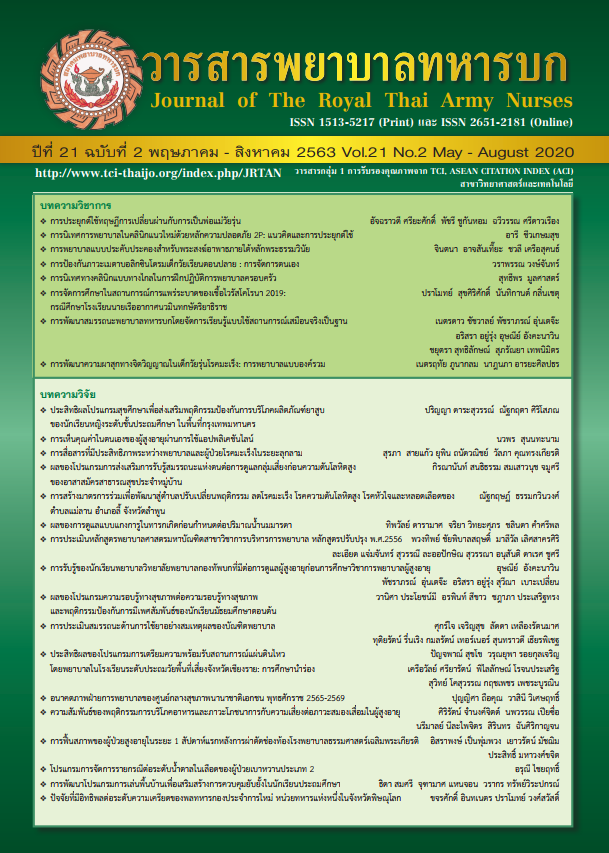An An Evaluation of Competency in Rational Drug Use of Nursing Graduates
Keywords:
evaluation of competency, rational drug use, nurse graduateAbstract
This descriptive study aimed to examine perceived competency in rational drug use of nursing graduates in bachelor of nursing science program after an implementation of integrating the rational drug use curriculum into the bachelor of nursing science program in academic year B.E. 2561. The population included 9,249 newly nurse graduates from 86 nursing education institutes in academic year B.E. 2561, and 4,269 graduates (46.15%) responded. The instrument used was a 46-item questionnaire regarding competency in rational drug use developed by the researchers based on the Prescribing Competency Framework, composed of 2 main competencies which were consultation and prescribing competencies. Data collecting was done online. Data were analyzed using descriptive statistics. The results revealed that nursing graduates perceived their overall competency in rational drug use was at a high level ( = 4.31, SD = 0.48). All categories of the competency were also rated at a high level. The highest score fell in the category of working with others as inter-professional team to promote rational drug use (
= 4.39, SD = 0.57). The lowest score was found in the category of considering the options (
= 4.22, SD = 0.53). Considering items in each category, the highest score was found in “assess the patient’s history” (
= 4.51, SD = 0.60). The study suggested that the Thailand Nursing and Midwifery Council should promote all nursing education institutes to integrate the rational drug use curriculum into their nursing curriculum in order to improve nursing competencies continuously.
Downloads
References
World Health Organization, Regional Office for South East Asia. Medicine in Health Care Delivery: Thailand situation analysis. New Delhi: WHO; 2015.
National Drug System Development Committee. National Drug Policy A.D. 2011 and National Drug System Development Strategy A.D. 2012-2016. (2nd edition). Bangkok: Aksorn Graphic and Design Publication; 2011. (in Thai)
Rational Use of Drug Subcommittee. Teacher’s guide for promoting rational drug use. Nonthaburi: Food and Drug Administration, Ministry of Public Health, Thailand; 2017. (in Thai)
Thailand Nursing and Midwifery Council. The model of integrating the rational drug use curriculum into the bachelor of nursing science program. Nonthaburi: Thailand Nursing and Midwifery Council; 2018. (in Thai)
Royal Pharmaceutical Society. A competency framework for all prescribers. Great Britain: The society; 2016.
Fan JY, Wang YH, Chao LF, Jane SW, Hsu LL. Performance evaluation of nursing students following competency-based education. Nurse Education Today 2015;35(1): 97-103.
Working Committee of Project Evaluation for Integrating RDU into Nursing Science Program, Thailand Nursing and Midwifery Council. Manual book of rational drug use instruction for nursing science program. Bangkok: Danex inter-corporation; 2019. (in Thai)
Rattanamanee N, Phasunon P. Response rate in quantitative research. Journal of Humanities and Social Sciences Thonburi University 2562; 13(3): 181-188. (in Thai)
Meehanpong P, Chatdokmaiprai K. Assessing quality of research instrument in nursing research. Journal of the Royal Thai Army Nurses 2018; 19(1): 9-15. (in Thai)
Sulosaari V, Huupponen R, Hupli M, Puukka P, Torniainen K, Leino-Kilpi H. Factors associated with nursing students’ medication competence at the beginning and end of their education. BMC Med Educ 2015; 15(223): 1-11.
Coyne E, Rands H. Enhancing student nurses’ medication calculation knowledge; integrating theoretical knowledge into practice. Nurse Education Today 2013; 33(9): 1014-19.
Sulosaari V, Kajander S, Hupli M, Huupponen R, Leino-Kilpi H. Nurse students’ medication competence- an integrative review of the association factors. Nurse Education Today 2012; 32: 399-405.
World Health Organization. Medicines: rational use of medicines. Fact sheet No.338 May 2010. 14. International Council of Nurses (ICN). The ICN Code of Ethics for Nurses. Geneva: ICN; 2012.
Tipkanajanaraykha K, Saleekul S. Role of nurses in prevention and management of inappropriate medication use in older adults. Journal of The Royal Thai Army Nurses 2019; 20 (1): 31-39. (in Thai)
Hatthakit U, Thanoi W. Holistic nursing and complementary therapy: an integration of the concepts into nursing education. Thai Journal of Nursing Council 2012; 27 (special issue): 5-17. (in Thai)
Intahphuak S. Medication errors reduction: applying nursing process in drug administration. Journal of Nursing Science & Health 2014;37 (4): 139-46. (in Thai)
Downloads
Published
How to Cite
Issue
Section
License
บทความหรือข้อคิดเห็นใดใดที่ปรากฏในวารสารพยาบาลทหารบกเป็นวรรณกรรมของผู้เขียน ซึ่งบรรณาธิการหรือสมาคมพยาบาลทหารบก ไม่จำเป็นต้องเห็นด้วย
บทความที่ได้รับการตีพิมพ์เป็นลิขสิทธิ์ของวารสารพยาบาลทหารบก
The ideas and opinions expressed in the Journal of The Royal Thai Army Nurses are those of the authors and not necessarily those
of the editor or Royal Thai Army Nurses Association.






